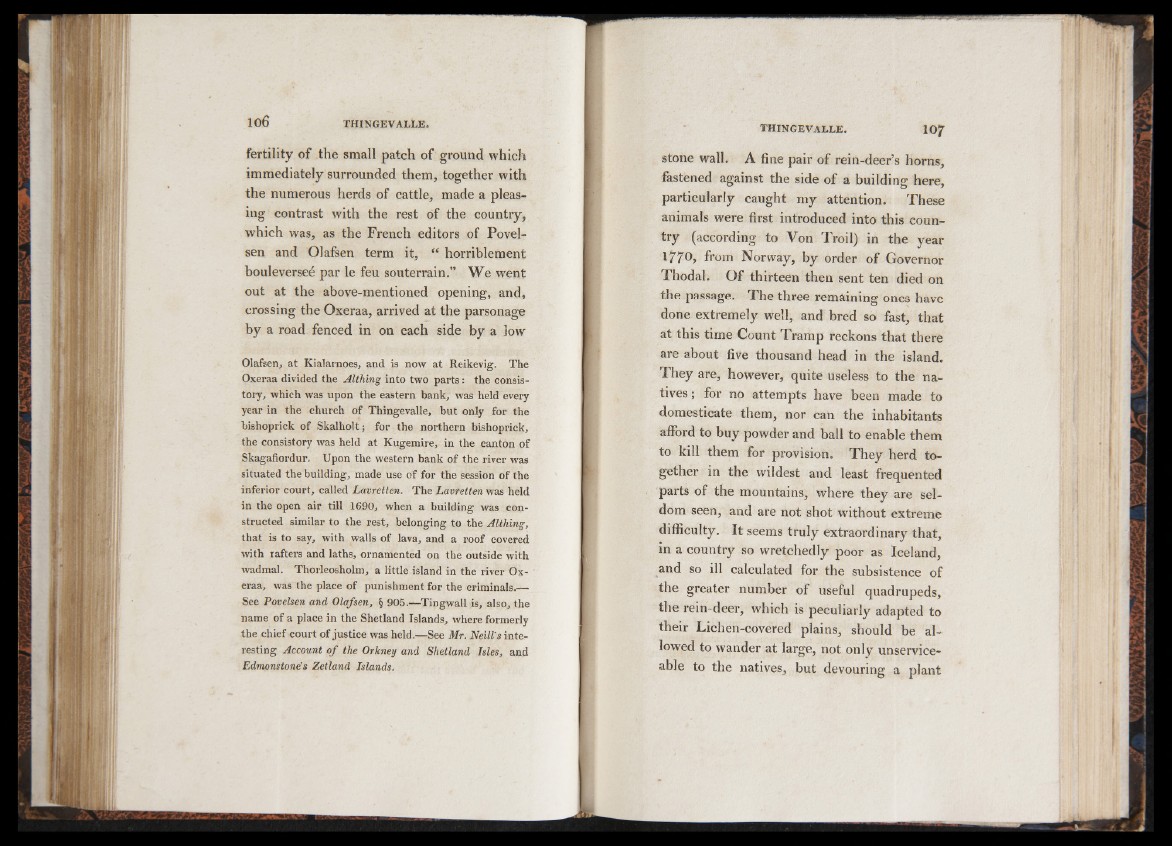
fertility of the small patch of ground which
immediately surrounded them, together with
the numerous herds of cattle, made a pleasing
contrast with the rest of the country,
which was, as the French editors of Povel-
sen and Olafsen term it, “ horriblement
bouleversee par le feu souterrain.” We went
out at the above-mentioned opening, and,
crossing the Oxeraa, arrived at the parsonage
by a road fenced in on each side by a low
Olafsen, at Kialarnoes, and is now at Reikevig. The
Oxeraa divided the Althing into two parts: the consistory,
which was upon the eastern bank, was held every
year in the church of Thingevalle, but only for the
bishoprick of Skalholt; for the northern bishoprick,
the consistory was held at Kugemire, in the canton of
Skagafiordur. Upon the western bank of the river was
situated the building, made use of for the session of the
inferior court, called Lavretten. The Lavfetten was held
in the open air till 1690, when a building was constructed
similar to the rest, belonging to the Althing,
that is to say, with walls of lava, and a roof covered
with rafters and laths, ornamented on the outside with
wadmal. Thorleosholm, a little island in the river Oxeraa,
was the place of punishment for the criminals.—
See Povelsen and Olafsen, § 905.—Tingwall is, also, the
name of a place in the Shetland Islands, where formerly
the chief court of justice was held.—See Mr. Neill's interesting
Account o f the Orkney and Shetland Isles, and
Edmonstone's Zetland Islands.
stone wall. A fine pair of rein-deers horns,
fastened against the side of a building here,
particularly caught my attention. These
animals were first introduced into this country
(according to Von Troil) in the year
177°> from Norway, by order of Governor
Thodal. Of thirteen then sent ten died on
the passage. The three remaining ones have
done extremely well, and bred so fast, that
at this time Count Tramp reckons that there
are about five thousand head in the island.
They are, however, quite useless to the natives;
for no attempts have been made to
domesticate them, nor can the inhabitants
afford to buy powder and ball to enable them
to kill them for provision. They herd together
in the wildest and least frequented
parts of the mountains, where they are seldom
seen, and are not shot without extreme
difficulty. It seems truly extraordinary that,
in a country so wretchedly poor as Iceland,
and so ill calculated for the subsistence of
the greater number of useful quadrupeds,
the rein-deer, which is peculiarly adapted to
their Lichen-covered plains, should be allowed
to wander at large, not only unserviceable
to the natives, but devouring a plant